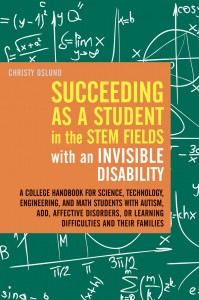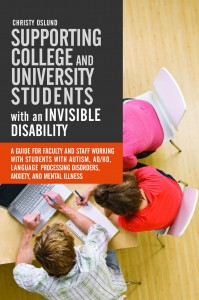Christy Oslund, Co-ordinator of Student Disability Services in the Dean of the Students’ Office at Michigan Technological University, shares helpful tips for parents on preparing students for a new school year and future independence.
Preparation for Independence
As students gear up for another year of school—perhaps even their last year or two before heading off to college or other independent goals—families tend to get caught up in last minute preparations. Do they have adequate school supplies, is it time to buy a scientific calculator, what will  the schedule look like for classes and for after school activities? It is easy to get buried in details.
the schedule look like for classes and for after school activities? It is easy to get buried in details.
We need to remind ourselves to step back and remember the big picture. We need to help our students be prepared not just for the immediate school term but for the future when they will be required to live more independently. Consider the following questions:
- Is my child able to take their medication reliably without reminders?
- Does my child know how to wash their own laundry?
- Could my child go shopping alone and find their own basic necessities?
- Have we practiced the child getting up and ready for school without assistance/wake-up calls?
- Has my child learned to shop for and cook a few simple meals?
- Can my child wash up after preparing a meal?
Until a person has had the opportunity to practice all these steps towards independence, he or she is not really ready for life away from home, whether that be in a trade school, college, university, or first job. Particularly with high functioning children who are very smart, we can easily forget how important these other day to day life skills are for the young person to grow into a successful adult. Rather than trying to take on teaching all of these skills at once, consider working on them one at a time. It will depend on your child which of these steps will come easiest and which will require the most work.
Consider starting with the step that is likely to be the least difficult for the individual child you are working with, so that your student can build on success as they approach the next goal. If for example, your child is naturally starting to get up in the morning for school, allow that to become an independent activity where he or she is responsible for getting out of the home on time. Realize that this may mean that your child will be late a few times; this is the price that has to be paid in helping your student work towards independence. Once your child leaves home, there will not be anyone getting t hem out the door on time and this is a skill that is best learned before they are expected to act like an adult.
hem out the door on time and this is a skill that is best learned before they are expected to act like an adult.
On the other hand, if your child has shown an interest in cooking, help them identify a few simple meals they would like to cook. Take them shopping and walk them through the process of choosing ingredients for the meal, paying, taking home the shopping, and preparation. For young people who find that process very involved, you may want to make clean up after the meal a separate lesson and learning opportunity.
Remember that almost everyone finds the most effective way to learn is to be given a chance for practice, with necessary explanation/information being provided by someone who has more experience with the skill being learned. If one wants to learn to milk a cow, one would look for a dairy farmer who has experience with milking; if one wants to learn to cook a meal, it helps if the person teaching has cooked before.
At the same time, parents and guardians can show the willingness to learn new skills themselves. If no one in the home is practiced at cooking a meal then helping the child prepare by learning this skill together—perhaps in a basic cooking class, or from a beginners cook book—demonstrates that learning new skills is always possible, and often necessary, no matter what stage we are at in life. By learning side by side with your child, you can demonstrate how to solve problems along the way:
- How will we prepare for shopping?
- How do we choose ingredients?
- How do we decide which pan to use?
- How can we tell if the heat we are using is too hot or not hot enough?
When more mature family members demonstrate how to solve problems as they are encountered, they also set another example that the child can learn from and call on later in life.
A new school year is an exciting, anxiety producing time of year. It is also a reminder that a child is continuing to grow towards eventual independence. Being mindful to include education and practice with the life skills needed outside of school is just as important as helping a child academically prepare for their future. Just as we wouldn’t expect a child to spontaneously start reading without previous education just because they have left home, we cannot expect them to suddenly know other life skills such as cooking, or getting up without reminders, just because they’ve moved. Use each day to practice these steps towards independence and you can ensure that your child has all the skills necessary to be successful.
Christy is the author of Succeeding as a Student in the STEM Fields with an Invisible Disability: A College Handbook for Science, Technology, Engineering, and Math Students with Autism, ADD, Affective Disorders, or Learning Difficulties and their Families and the forthcoming Supporting College and University Students with Invisible Disabilities: A Guide for Faculty and Staff Working with Students with Autism, AD/HD, Language Processing Disorders, Anxiety, and Mental Illness both published by Jessica Kingsley Publishers.